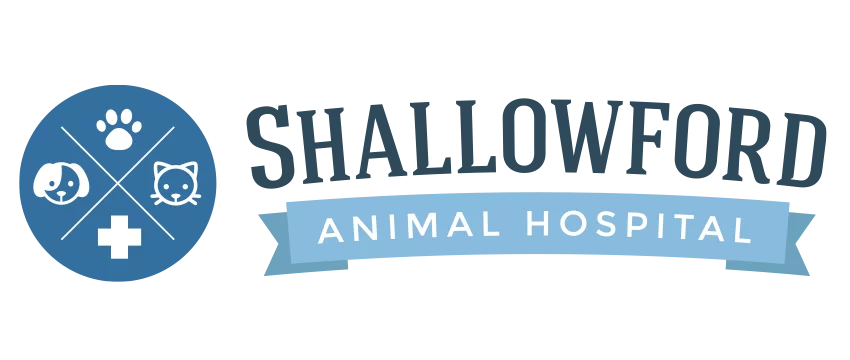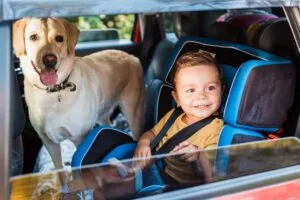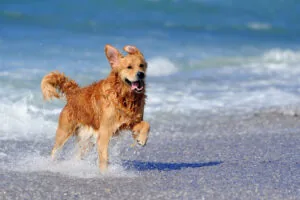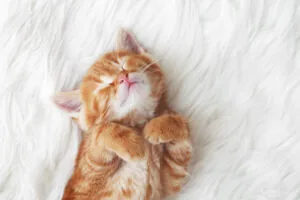Holidays Tips and Dangers to Avoid
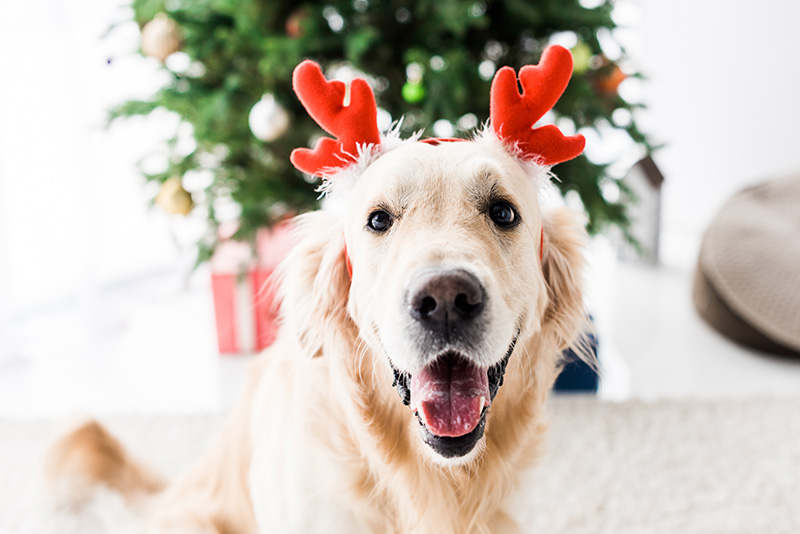
The holiday season is upon us, and many pet parents plan to celebrate with their pets. As you get ready for the holidays, it is important to try to keep your pet’s eating and exercise habits as close to their normal routine as possible. Also, please be sure to steer pets clear of the following unhealthy treats, toxic plants, and dangerous decorations.
Seasonal Plants and Decorations
Christmas Tree
Securely anchor your Christmas tree so it doesn’t tip and fall, causing possible injury to your pet. This will also prevent the tree water—which may contain fertilizers that can cause stomach upset—from spilling. Stagnant tree water is a breeding ground for bacteria, and your pet could end up with nausea or diarrhea should he imbibe. If possible, set up the tree in a room that can be closed off with doors. Also, it’s a good idea to secure your tree to the ceiling with a fishing line to keep it from crashing down if your cat does decide to climb it.
Mistletoe and Holly
Holly, when ingested, can cause pets to suffer nausea, vomiting, and diarrhea. Mistletoe can be very toxic to animals, and you should seek veterinary consultation immediately if your pet has potentially ingested any part of the plant. Mistletoe can cause vomiting, severe diarrhea, difficulty breathing, shock and death within hours of ingestion.
Poinsettias
Poinsettias have received bad publicity in the past whereas, in fact, poinsettias are not very toxic to pets. They do contain a milky sap that can irritate the mouth but if signs develop, they are usually mild.
Tinsel
Kitties love this sparkly, light-catching “toy” that’s easy to bat around and carry in their mouths. But a nibble can lead to a swallow, which can lead to an obstructed digestive tract, severe vomiting, dehydration and possible surgery. It’s best to brighten your boughs with something other than tinsel.
Holiday Ornaments
Ornaments can cause hazards for pets. Broken ornaments can cause injuries, and ingested ornaments can cause intestinal blockage or even toxicity. Keep any homemade ornaments, particularly those made from salt-dough or other food-based materials, out of reach of pets. When decorating for the season, consider your pets. Holiday decorations such as snow globes or bubble lights may contain poisonous chemicals. If your pet chews on them the liquid inside could be dangerous to their health. Methylene chloride, the chemical in bubble lights, can result in depression, aspiration pneumonia and irritation to the eyes, skin and gastrointestinal tract.
Candles
Don’t leave lighted candles unattended. Pets may burn themselves or cause a fire if they knock candles over. Be sure to use appropriate candle holders, placed on a stable surface. And if you leave the room, put the candle out!
Electric
Keep wires, batteries, and glass or plastic ornaments out of paws’ reach. A wire can deliver a potentially lethal electric shock and a punctured battery can cause burns to the mouth and esophagus, while shards of breakable ornaments can damage your pet’s mouth and digestive tract.
Tip: When You Leave the House, unplug decorations while you’re not around. Cats, dogs and other pets are often tempted to chew electrical cords.
Avoid Holiday Food Dangers
Special Treats
Stick with chew toys that are basically indestructible, Kongs that can be stuffed with healthy foods or chew treats that are designed to be safely digestible. Long, stringy things are a feline’s dream, but the riskiest toys for cats involve ribbon, yarn and loose little parts that can get stuck in the intestines, often necessitating surgery. Surprise kitty with a new ball that’s too big to swallow, a stuffed catnip toy or the interactive cat dancer.
Tip: Keep people’s food away from pets. If you want to share holiday treats with your pets, make or buy treats formulated just for them. The following people foods are especially hazardous for pets:
Chocolate
An essential part of the holidays for many people, but it is toxic to dogs and cats. Although the toxicity can vary based on the type of chocolate, the size of your pet, and the amount they ate, it’s safer to consider all chocolate off-limits for pets.
Sweets/Baked Goods
Also should be kept out of reach. Not only are they often too rich for pets; an artificial sweetener often found in baked goods, candy and chewing gum, xylitol, has been linked to liver failure and death in dogs.
Turkey and other table scraps
Sometimes even in small amounts – can cause a life-threatening condition in pets known as pancreatitis. Including gravy and meat fat –also should be kept away from pets. Many foods that are healthy for people are poisonous to pets, including onions, raisins, and grapes. During the holidays, when our own diets tend toward extra-rich foods, table scraps can be especially fattening and hard for animals to digest and can cause pancreatitis. Fatty, spicy and no-no human foods, as well as bones, should not be fed to your furry friends. Pets can join the festivities in other fun ways that won’t lead to costly medical bills.
Alcohol
Because alcohol is rapidly absorbed into the bloodstream, it affects pets quickly. Ingestion of alcohol can cause dangerous drops in blood sugar, blood pressure, and body temperature. Intoxicated animals can experience seizures and respiratory failure. Additionally, foods such as desserts containing alcohol and unbaked dough that contains yeast should be kept away from pets as they may result in alcohol toxicity, vomiting, disorientation and stomach bloat.
Tip: Clear the food from your table, counters and serving areas when you are done using them – and make sure the trash gets put where your pet can’t reach it. Trash also should be cleared away where pets can’t reach – especially sparkly ribbon and other packaging or decorative items that could be tempting for your pet to play with or consume.
Quick action can save lives. If you believe your pet has been poisoned or eaten something it shouldn’t have, call your veterinarian or local veterinary emergency clinic immediately. You may also want to call the ASPCA Poison Control Hotline: 1-888-426-4435. Signs of pet distress include sudden changes in behavior, depression, pain, vomiting, or diarrhea.
Hosting Parties and Visitors
Visitors can upset pets, as can the noise and excitement of holiday parties. Even pets that aren’t normally shy may become nervous during a holiday gathering. The following tips will reduce emotional stress on your pet and protect your guests from possible injury. All pets should have access to a comfortable, quiet place inside if they want to retreat. Make sure your pet has a room or crate somewhere away from the commotion, where your guests won’t follow, that it can go to anytime it wants to get away.
Even if your pets are comfortable around guests, make sure you watch them closely, especially when people are entering or leaving your home. While you’re welcoming hungry guests and collecting coats, a four-legged family member may make a break for it out the door and become lost. Identification tags and microchips reunite families. Make sure your pet has proper identification with your current contact information – particularly a microchip with up-to-date, registered information. That way, if they do sneak out, they’re more likely to be returned to you. If your pet isn’t already microchipped, talk to your veterinarian about the benefits of this simple procedure.
Holiday Travel
Interstate and international travel regulations require any pet you bring with you to have a health certificate from your veterinarian – even if you are traveling by car. Learn the requirements for any states you will visit or pass through, and schedule an appointment with your veterinarian to get the needed certificate within the timeframes required by those states.
Pack for your pet as well as yourself if you’re going to travel together. In addition to your pet’s food and medications, this includes bringing copies of their medical records, information to help identify your pet if it becomes lost, first aid supplies, and other items. Pets in vehicles should always be safely restrained and should never be left alone in the car in any weather. Proper restraint means using a secure harness or a carrier, placed in a location clear of airbags. Never transport your pet in the bed of a truck.
If you’re traveling by air and considering bringing your pet with you, talk with your veterinarian first. Air travel can put some pets at risk, especially short-nosed dogs. Your veterinarian is the best person to advise you regarding your own pet’s ability to travel.
If you’re boarding your dog while you travel, talk with your veterinarian to find out how best to protect your pet from canine flu and other contagious diseases, and to make sure your pet is up-to-date on vaccines.
Knowing all the tips and holiday hazards will allow you, your family and friends, and your pets to have the very best holidays.
Share This Post
Recent Posts
About Shallowford Animal Hospital
Shallowford Animal Hospital and The Pet Spa at Shallowford are dedicated to the exceptional, compassionate care your pet deserves. Pets hold a very special place in our families, and we treat yours like our own.
